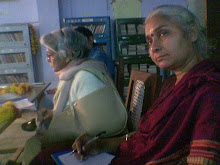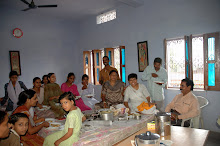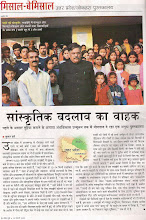1. Name of the organisation Sri Ramanand Saraswati Pustkalaya
2. Registration No./Date/Place of Registration- 1019/93-94/4-1-1994
3. Place of Registration- Azamgarh
4.FCRA No./Date of Issue- II/ 21022/73(169)/ 2005 / ,Reg. No.- 136250046 / ,Date-- 09/ 08 / 05
4.Address-- Sri Ramanand Saraswati Pustkalaya, Jokehara, Azamgarh, 276136
5.Phone Number/Fax Number/E-mail-05466-239615,05466-239448 , 9452332073 / srsp1993@yahoo.co.in/ sriramanandsaraswatipustkalaya.blogspot.com
6.Name of Responsible Individual ( Name/Designation/Phone Number / E-mail)Sri Shesh Nath Rai / Secretary / srsp1993@ yahoo.co.in
7.Organizational Structure-
7-1. Year of Establishment- 1993-1994
7-2. Nature of the Organization- Social, cultural and educational
7-3. Number of Branches, Field Offices and their location nil
8.Purpose of Establishment, Vision and/ Mission Statement
Vision:-
SRSP intends to combat two major biases of the Rural India related to cast and gender which may help creation of a just and equitable social order. It is committed to the goal of enabling Rural India to live life of dignity and respect.
Mission:-
SRSP works for the sustainable social and economic empowerment of women and dalits. The focus is on rights based approach through which these marginalized segments of the Rural India are sensitized about the dignity of their human existence. The tools of this endeavor are education, capacity building by skill up gradation, exposure to the laws of the land and international conventions and creative activities like theatre, music, and painting. Efforts are also made to involve these potential groups in such efforts like water conservation, forestry and preservation of oral and written folk traditions which may enrich their life. Special attention is paid to the improvement of their health and hygiene.
9. Main Activities of the Organization-
During more than one decade of its existence SRSP has turned into a prominent cultural centre of the country. Initially started with an aim to promote the culture of book reading, very soon it got involved in many other activities of community development. It took a moderate project of adult literacy with an aim of making every body in the village Jokehara literate and this target was achieved in three years. To sensitise villagers on gender and dalit issues many discourses were organised in which social activists like Teesta Setalwad, Shabana Azmi, Medha Patkar, Asgar Ali Engineer, and Acharya Ram Murti along with the hosting of writers, playwrights, poets, academicians, photographers and film and theatre critics. It was believed that the exposure to such a wide variety of experiences and ideas, the youth of Jokehara and its neighbouring villages would be able to come out of their caste and gender constraints.
Click Here!
Jokehara and the villages around it are like any other village of eastern Uttar Pradesh where caste and gender lines are very pronounced. SRSP, since its inception, has tried to mobilise the marginalised sections, specially women and dalits, against the social odds. It was not at all an easy task.. SRSP, had adopted a strategy to motivate dalits to challenge the system which denied them dignity and equality without provoking and inviting hostilities from the upper castes. SRSP had appointed a chamar, lowest in the caste system, as librarian. Initially this led to very strange situations. For example the librarian would not sit before an upper caste reader or an upper caste reader may find it humiliating to ask the librarian to help him in searching a book. During functions when their were visitors from outside the librarian would feel hesitant in sitting with them at the dining table and even if he sat, there was always a posibility that he would be ridiculed by an upper caste person. Gradually the situation changed and the dalit librarian was accepted as equal.
9. a. Theatre Brings Perceptible Changes In The Life Of Women
Social change through cultural interventions and theatrical activities helped a lot in bringing a perceptible change in the situation. The beginning was not a conscious effort. National School of Drama, New Delhi organised its first training cum production workshop in December 2003 at SRSP. Initially everyone was sceptical about the response of women to the workshop but to everybody's surprise large number of girls participated in the camp. For them it was like freedom from mundane, routine chores of a male dominated family life where they had very little elbow space for joy and creativity. It was another departure from the caste guided behavioural pattern. Boys and girls of different castes used to spend the whole day together singing, dancing and rehearsing. Initially there was a mental barrier among them but slowly and unknowingly it disappeared and they started to share their midday meal as well. The first theatre camp changed many things in the life of village Jokehara. Women started visiting library in more numbers. There was a perceptible change in the confidence level and they started participating more freely in the discussions organised by the library. Since then many theatre camps with the support of National School Of Drama, New Delhi, Bhartendu Natya Academy, Lucknow and North Central Zone Cultural Centre, Allahabad have been organised and it has further cemented the process.
9. b. Empowerment Through Income Generating Programmes
SRSP is actively engaged in economic empowerment of local community and developing their income-generation capacity. It is running two centres under the Community Polytechnic Scheme of government of India. One centre is imparting training in typing and shorthand and the other is engaged in stitching and embroidery. The objective of the programme is to make local young boys and girls learn vocational skills and become self dependent. These vocational courses have helped villagers, especially women and dalits, in developing their confidence. The library is also running a computer training centre. The organisation believes that a good number of these trainees will soon be able to start their own enterprises.
The organisation had successfully run a project of rearing honeybee which was supported by CAPART. Under this programme 50 economically backward farmers have been given honey boxes with other accessories. The organisation has given them training and provides them with regular support. The project is expected to give them a regular and sustainable source of livelihood. With the completion of this project , more beneficiaries are expected to be covered under this programme and the project may be replicated in other areas.
At present SRSP is running a training course for motorcycle and scooter mechanics.30 young boys , mostly from the marginalised sections are enrolled in the programme. Nehru Yuva Kendra, New Delhi is supporting it.
National Bank for Agriculture and Rural Development (NABARD) is supporting SRSP in its endeavour to organise grass root women self help groups. Many such groups have been organised so far which are not only sensitising their members about their rights and dignity as a person but also upgrading their skills through various training inputs so that they can earn a decent livelihood. These self help groups have linkages with banks. Efforts are on to develop some of these into small level entrepreneurs.
9. c. Physical Fitness and Sports Activities-
Physical fitness is the strength of any community. SRSP has started a volleyball nursery where about 80 boys of different age groups are learning the game under the watchful eyes of a trained coach. SRSP has also established a gymnasium which provides the youth of the area an opportunity to exercise and maintain their physical fitness.
9. d. Our Partners-
Over the years SRSP has not only diversified its activities, it has also established fruitful relationships with institution/organisations like National Book Trust, National School of Drama, Sahitya Academy, Ministry of Culture-Government Of India, North Central Zone Cultural Centre, CAPART, Raja Ram Mohan Roy Library Trust, Ministry of Health and Family Welfare - Govt of India, Ministry of Human Resources Development, Government of India, Nehru Yuva Kendra, OXFAM and NABARD.
sri ramanand saraswati pustkalaya
Subscribe to:
Post Comments (Atom)
Women dare to ask question:
The mundane and routine life of Prabhawati had always been on the receiving end. Poverty, ill treatment of in laws and regular beating by a drunkard husband Bhagwat were all she could remember till she met Kusum and Pushpa, two activists on gender issues. SRSP, with support of OXFAM, has initiated a campaign against gender violence in fifteen surrounding villages. Prabhawati's village Sahnupur is one among these. She learnt the art of protest during interaction with Kusum and Pushpa and that was the beginning of the end of accepting cruelty without asking questions. "How dare you ask question" was the reaction of Bhagwat, with a sense of disbelief on his face, one day when he slapped her and a defiant Prabhawati asked uncomfortable questions. Since then Prabhawati never looked back. She giggles while narrating, before women participants in a discourse on gender, how she reacts to the violent behaviour of her husband and how much he fears raising his hands on her because he knows that she will pay him back in the same coins. Prabhawati is one of many women of different age groups who regularly attend various capacity building programmes and discussions organised by SRSP. These exposures have taught them to ask questions and not to accept violence against them in different forms and at various levels.
Letters from a Goa prisoner to writers: Sumant Bhattacharya in Indian Express of 18 th January 1998
NEW DELHI, January 17: From his tiny cell in Goa's Central Jail, Sudhir Sharma, Inmate No 797, has been fighting a long and lonely battle: he wants to read. The Constitution and the Supreme Court say he has the right to do so, his prison authorities say no.Sharma, a former addict, was arrested in 1993 and sentenced to a 10-year jail term under the Narcotics Act. While in prison, one day, a fellow inmate showed him a copy of Pahal, a monthly Hindi literary magazine. It was this that, Sharma says, gave him a reason to live.
He wrote to Pahal editor, noted Hindi writer Gyanranjan, who sent him his books. They reached the jail but authorities said he couldn't read them. The books were sent back and Sharma was moved to a sub-jail, in Vasco, where, he says, the conditions are worse.
Still, he keeps writing letters, to Gyanranjan, Hindi novelist and DIG of Border Security Force, Vibhuti Narain Rai; authors Nirmal Varma, S R Yatri and Asghar Wajahat. These letters aren't sent through ``official channels'', he smuggles them out, sometimes through an inmate on his way to the hospital, a friendly warden or an inmate's relative. In his latest letter to Rai on December 10, 1997, Sharma says he's perhaps paying for raising his voice.
The story of his life, as told through his letters: Once a student of Delhi University, Sharma left home for Mumbai. He began working for the underworld don Karim Lala's nephew Samad Khan, fell in love with a ``penfriend'' from Jodhpur. Things changed when Samad Khan was killed and his girlfriend ditched him. Sharma became an addict and began to peddle drugs until he landed in jail.
He clocked his days in despair until he read Pahal. ``Pahal ke ank ne meri zindagi mein pranvayu ka sanchar kiya,'' he writes in a letter to Rai. (Just one issue of Pahal gave me a fresh lease of life). He goes on to thank Gyanda (Gyanranjan) for accepting a prisoner as a reader. ``Thank you for agreeing to share your books with a criminal. I know I have done something wrong but I am conscious. Don't I have the right,'' he asks, ``to know what's going on, to be sensitive?''
Books and magazines came pouring in which jail authorities confiscated. He also wrote to Kiran Bedi. In a letter, he says he believes that his persecution by the jailer was largely due to his attempt to spill the beans in the letter to Bedi.
The IG (Prison), Goa, and the superintendent of the Central Jail in Aguada, quoted the jail manual to justify their action. In a letter to Rai dated July 8, 1996, the superintendent says:
"In view of Rule 17 of the Goa Daman and Diu Prisons (Facilities to the prisoners) Rules 1968, the parcel which was sent by you was refused by this jail."
According to this rule, prisoners' mail, both incoming and outgoing, "shall be carefully censored." And a prisoner may be asked to give "a list of persons with whom he is likely to correspond during his period of imprisonment. As far as practicable, this list shall be scrutinised."
Jail authorities claim that since these authors' names don't figure in this list, he cannot receive anything from them.
This despite a 1979 ruling by a Supreme Court bench comprising Justices V R Krishna Iyer, R S Pathak and O Chinnappa Reddy. The judges had said: "No prisoner can be personally subjected to deprivations not necessitated by the fact of incarceration and the sentence of the court. All other freedoms belong to him, to read and write... to creative comforts... to movement within the prison campus subject to the requirements of discipline and security, to the minimal joy of self-expression, to acquire skills... all other fundamental rights tailored to the limitations of imprisonment."Speaking to The Indian Express, G H Kenaudekar, additional Deputy Collector and Deputy IG (Prison), Goa north, says: "As per rules, books will not be given to prisoners but will be kept with jail authorities." When told of the Supreme Court's ruling, he says that probably the jail administration is not aware of the decision.
Ironically, the books sent to Sharma by Kiran Bedi, who was given the Magsaysay award for reforms in Tihar jail, were also returned. Says Bedi: "The Goa jail administration has overlooked the verdict and directions of the Supreme Court. It should be brought to book for this." Until that happens, Inmate No 797 will keep waiting -- and writing.















.jpg)













No comments:
Post a Comment